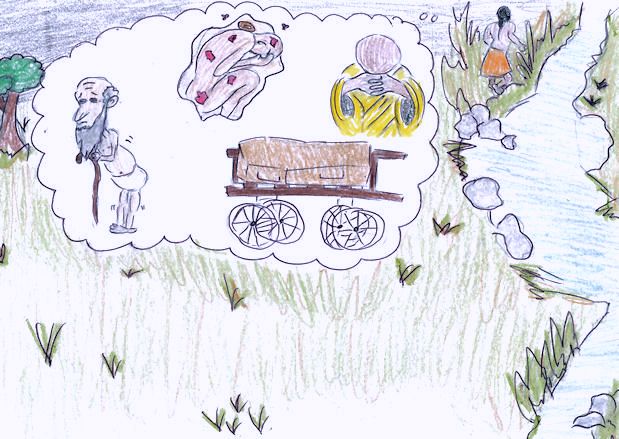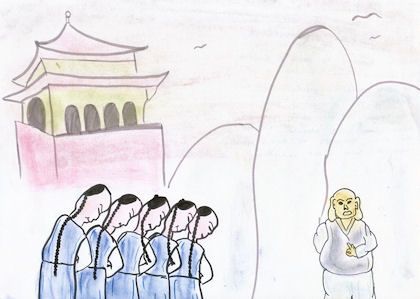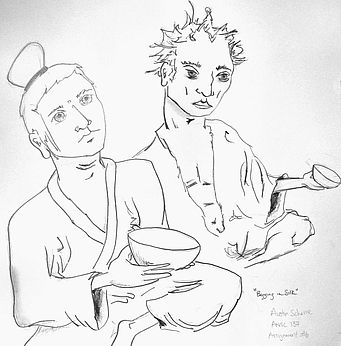
Prince Xīdá-duō left his family to become a wandering hermit.
Drawing by Lauren Gretz, John Muir College (UCSD), by permission
A little further along the banks of the River Dá'ēnòumǎ , there was a grove of mangos called Ē-luóbì-kēpān 阿罗毕疴潘, and Xīdá-duō now went there and stayed for seven days.

When he heard the news of Xīdá-duō's departure, King Jìngfàn was horrified. This was exactly what the prophecy had foretold him, and exactly what he had spent the last three decades trying to avoid. He immediately sent five trustworthy servants to try to dissuade the prince. They were:
They hurried out, and soon found the prince and asked him why he hated his family and his country and wished to leave them.
Xīdá-duō explained that he did not hate his family or his country but rather wished to save them by discovering how to relieve the world of suffering, and that he would do this by religious exercises.

Xīdá-duō had always been a wonderfully persuasive master of rhetoric, and when the servants heard what he had to say, they were completely persuaded. Jiāo-chénrú was the first among them to decide to stay and become a mendicant himself, and to seek enlightenment with Xīdá-duō. Soon they had all decided to stay and become mendicants too, and to seek enlightenment with him.
Xīdá-duō and the five mendicants journeyed south until they reached the town of Wángshè 王舍, capital of the land of Mójiē-tuó 摩揭陀, which was ruled over by a king named Pínpó-suōluó 频婆娑罗.
In the morning Xīdá-duō washed in the river. Then, like other people who had left their families, he and his five companions took alms bowls and begged for their food, like other ascetics.
In India in those days, ascetics engaged in religious exercises were well respected, and people believed that it would bring them benefit to help them, so many people contributed to religious believers with their begging bowls (tuōbō 托钵).

But people who saw Xīdá-duō immediately could see that he was not like other beggars.His bearing was too princely, for one thing. And indeed, even his clothes were too princely, for he had not possessed anything truly shabby when he left his family. Although few knew who he was or how he came to be among them, they gave him only their best food.
When he had begged as much food as he needed Xīdá-duō left the town of Wángshè and went to Pēntuó-wā 奔陀洼 Hill to eat what they had given him.
Word of him soon reached the ear of King Pínpó-suōluó, who sent one of his princes to visit Xīdá-duō to find out whether this strange visitor might be the missing heir of the king of Jiāpí-luó who had given up his throne to learn how people could avoid the suffering of old age, sickness, and death, and who had converted the five servants sent to persuade him to return home.
Once it had been confirmed, King Pínpó-suōluó went himself to Pēntuó-wā Hill to try to persuade Xīdá-duō to come and dwell in his palace. But Xīdá-duō politely refused, saying he would not live again in one place till he had found what he sought: Perfect Awareness (zhèngjué 正觉). After that he would be happy to visit.